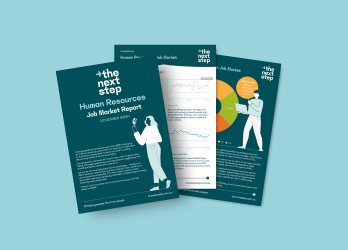Six forces reshaping HR in 2025
Your executive team is asking for AI strategy. Your employees want more flexibility. And somewhere in between, you're tasked with maintaining the human touch that keeps your organisation thriving. Welcome to one of the most significant HR trends 2025 has brought: the challenge isn't just managing change—it's mastering it.

Global shifts demand local action
As we analyse HR trends 2025, your role in enabling organisational success has never been more vital. As Trump embarks on his second presidential term, the world waits to see what impact this creates in global economic and trade conditions—and how it flows through to employment trends in the Australian market. Against this backdrop of geopolitical tensions, rapid technological evolution and the ongoing transformation of work itself, your ability to navigate change has never been more critical.
Let's explore the key forces reshaping HR and how you can position your organisation for success in this dynamic landscape.
AI integration takes centre stage
Among the defining HR trends 2025 presents, AI sophistication stands out. While most organisations are already experimenting with AI tools, success this year will come from thoughtful implementation that solves real business problems.
AI will play a key role in People and Culture processes, from recruitment and onboarding to streamlining administrative operations and measuring engagement. Understanding your data will be essential in making informed HR decisions, identifying training needs, better managing workforce mobility and predicting where you might expect increased or decreased turnover.
The organisations leading the way are those that have moved beyond basic automation to create integrated AI strategies that enhance rather than replace human capability.
The hybrid debate evolves
This conversation isn't going anywhere in 2025. While hybrid work is here to stay, different organisations are on different paths—and one size doesn't fit all. Finding the common ground that accommodates both business and individual needs effectively will be critical.
Employer sentiment is trending towards more collaboration time, where colleagues come together to connect, learn and solve problems. Your challenge lies in effectively redesigning what is done when in the office versus remotely, providing better clarity for all parties—individual, team and business. The focus needs to shift from measuring productivity through presence to creating environments where employees can grow and develop the skills needed for tomorrow.
Perhaps the real question isn't about where work happens, but how we create the best learning environment for employees to develop future skills while delivering value today. This requires a fundamental rethink of how we measure and enable productivity in a transformed world of work.
Human-centric engagement
Looking at HR trends 2025, People Experience continues to be a key retention and engagement strategy. With an unprecedented age diversity spanning from Gen Z to Baby Boomers in today's workforce, it's a complex challenge to create workplace experiences that resonate across such different life stages and career phases.
Focus on creating cultures where employees feel valued and supported. You'll need holistic strategies encompassing flexibility, redefined benefits both financial and non-financial, and enhanced wellbeing initiatives. Mental health support is becoming non-negotiable, requiring both practical benefits and educated leadership capable of recognising signs of burnout and providing appropriate support.
DEI remains crucial
Despite Trump's stated position in the US, Australia's push towards diversity will continue. Your DEI initiatives need to be informed by improved data to monitor progress against identified gaps.
Balancing this with a merit-based approach remains front and centre. However, in areas such as gender diversity, the imbalance at senior levels remains glaring, with the vast majority of ASX listed CEOs male and minimal female representation in Chair roles for the ASX20. The focus needs to evolve beyond representation to place more emphasis on inclusion and belonging.
Change management evolution
As HR trends 2025 reveal, effective change management has become crucial in an environment of rapid transformation, tech disruption and increasing AI influence. Supporting employees through these changes while enhancing their expertise will be key to successful adoption.
HR plays a critical role in helping businesses redesign not just how work is done, but how it's organised and operates. Looking at structures that are leaner, flatter and better enabled by AI will likely lead towards more agile ways of working that enable better connectivity across functions and locations. This may mean a requirement for fewer 'middle managers', but what's certain is the need for managers to focus far more on adaptive and outcome-based leadership approaches.
Success in this transformation requires HR to look beyond traditional change management approaches. Your role extends to supporting the business in redefining operating models, enabling cross-functional collaboration and ensuring leaders at all levels are equipped to drive and sustain change.
Embracing the future
As we examine HR trends 2025, your organisation's resilience and ability to adapt has never been more challenged. The scale and pace of change continues to accelerate, and people have never been more important in shaping the right pathway forward.
Organisations and HR functions that can embrace these changes, remain agile in their thinking and execution, and strategically harness the opportunities that successful AI adoption brings—while remaining human-centric—will lead the way in what promises to be both a daunting yet exciting year ahead, full of opportunity.
Looking for a new role? Search HR jobs
Need help filling a position? Contact Us
Other articles you might be interested in
Let’s connect
SYDNEY
THe Commons, LEVEL 4
388 George Street
Sydney NSW 2000
GADIGAL land
MELBOURNE
LEVEL 1, SUITE 3
500 BOURKE ST
MELBOURNE VIC 3000
EASTERN KULIN LAND
BRISBANE
Level 14
241 Adelaide st
Brisbane QLD 4000
YUGGERA LAND
The Next Step acknowledges and pays respect to the Traditional Custodians of the lands on which we work.
© THE NEXT STEP 2025



